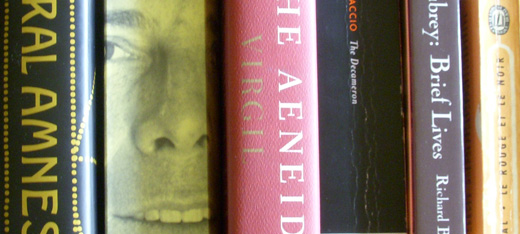Tuesday Morning Read
Quis mihi nunc tot acerba deus, quis carmine caedes
diversas obitumque ducum, quos aequore toto
inque vicem nunc Turnus agit, nunc Troius heros, expediat?
Now what god can unfold for me so many terrors?
Who can make a song of slaughter in all its forms —
the deaths of captains down the entire field,
dealt now by Turnus, now by Aeneas, kill for kill?
¶ Done. I have finished, forever, with the Aeneid. Or perhaps I have just begun. Virgil’s elegant Latin is but the silver husk of the grisliest barbarity. Not once in this epic have the ends of war been justified — much less the means! If this disgusting bloodlust is an inescapable part of our human nature — and I do not believe that it is; rather, it is an aristocratic affectation — then we can do the universe no swifter favor than immolating our human race in a final holocaust.
¶ Writing more about an encounter than about a famous figure, Clive James, with Charles Chaplin his nominal subject, soars to the top of his form, with an concise articulation of the difference between the humanities and the sciences — according to his brilliant insight, a matter of history.
Science lives in a perpetual present, and must always discard its own past as it advances. … The humanities do not advance in that sense: they accumulate, and the past is always retained. The two forms of knowledge thus have fundamentally different kinds of history. A scientist can revisit scientific history at his choice. A humanist has no choice: he must revisit the history of the humanities all the time, because it is always alive, and can’t be superseded. Two different kinds of history, and two different kinds of time. Humanist time runs both ways: an arrow with a head at each end.
I would have college students read the entire passage at the beginning of each school year, to be memorized as a prerequisite for graduation.
¶ In Le rouge et le noir — a work that I foresee dealing with, in the next couple of days, as I have just dealt with the Aeneid by reading all thousand lines of the final book in one sitting — Julien has two prison-cell interviews and fears a third. For all his strutting attitude, we still have no idea why he premeditated — he keeps harping on that word, préméditation — the murder of Mme de Rênal. The why why, I mean. His thinking before the crime remains sealed off, invisible, and Julien’s behavior seems more trance-like than deliberate. This really is not only a book about adolescence.
¶ In Aubrey: Hoskyns, Hyde, Isaacson, Jaquinto (“Physician to the Pope, then to King James.”), Jenkins (David), Jenkins (Leoline), Johnson, and Inigo Jones. We’re told that John Hoskyns was the “flower” of his class at Winchester, even though in the next breath Aubrey discloses a very sordid stunt of cheating. As for the great Inigo Jones, Aubrey locates his monument, his tomb; lists his two principal works of architecture; and reports that so-and-so has “all his papers and designs.” All this takes fifty words or less. Then:
Memorandum: Mr Emanuel De Critz (sergeant painter to King Charles I) told me in 1649, that the catafalque of King James at his funeral (which is a kind of bed of state erectred in Westminster Abbey, as Robert, earl of Essex, had, Oliver Cromwell and general Monck) was very ingeniously designed by Mr Inigo Jones, and that he made the four heads of the caryatics (which bore up the canopy) of plaster of paris, and made the drapery of them with white calico, which was very handsome and cheap, and showed as well as if they had been cut out of white marble.
We know that Inigo Jones was, yes, something of a party planner, but it’s oddly unusual for Aubrey to be so instructive about things the reader might not know. Catafalques and caryatics seem curiously unfamiliar to Mr Memorandum.
¶ In the Decameron — which I am enjoying far too heartily to want to get out of the way — yet another story about Calandrino, Bruno, and Buffamalco, with Dr Simone thrown in for good measure. This time, Calandrino is separated from a small windfall by his party-animal friends after they convince him that he is pregnant, and that the cure will cost a small fortune. Calandrino’s response to the news that he is with child is to blame his wife.
“Ah, Tessa, this is your doing! You will insist on lying on top. I told you all along this would happen.”
He continues (and I shall leave it in the original, out of delicacy):
“…se tutti bisognano, tutti gli togliete, pur che io non abbia a partorire, ché io non so come io mi facessi; ch’io odo fare alle femine un sì gran romore quando son per partorire, con tutto che elle abbiano buon cotal grande donde farlo, che io credo, se io avessi quel dolore, che io mi morrei prima che io partorissi.”
He’s got that right.

